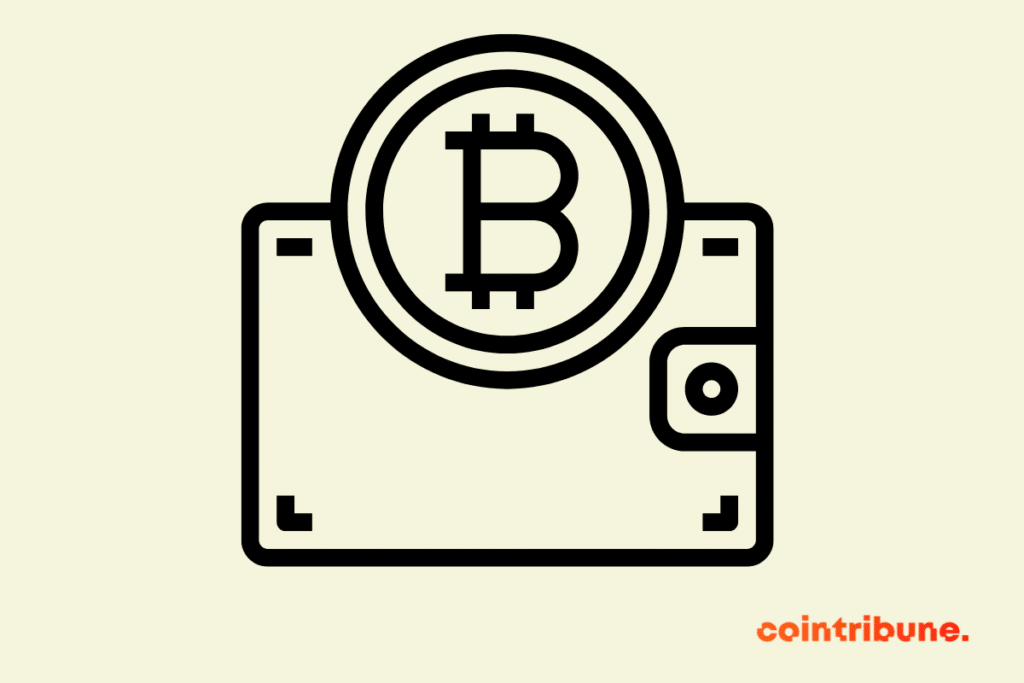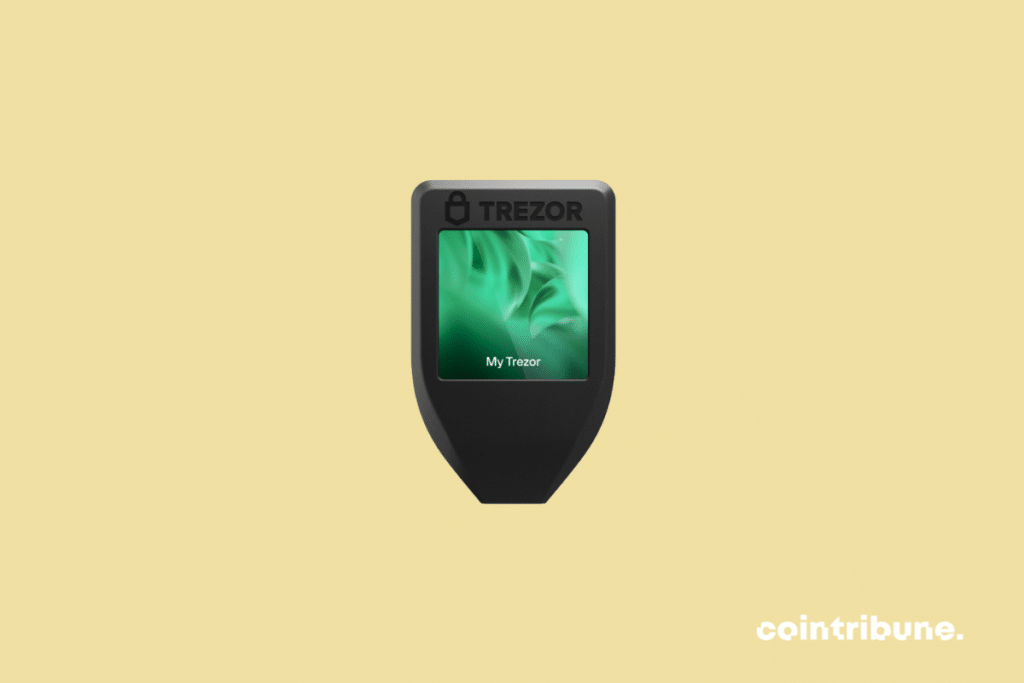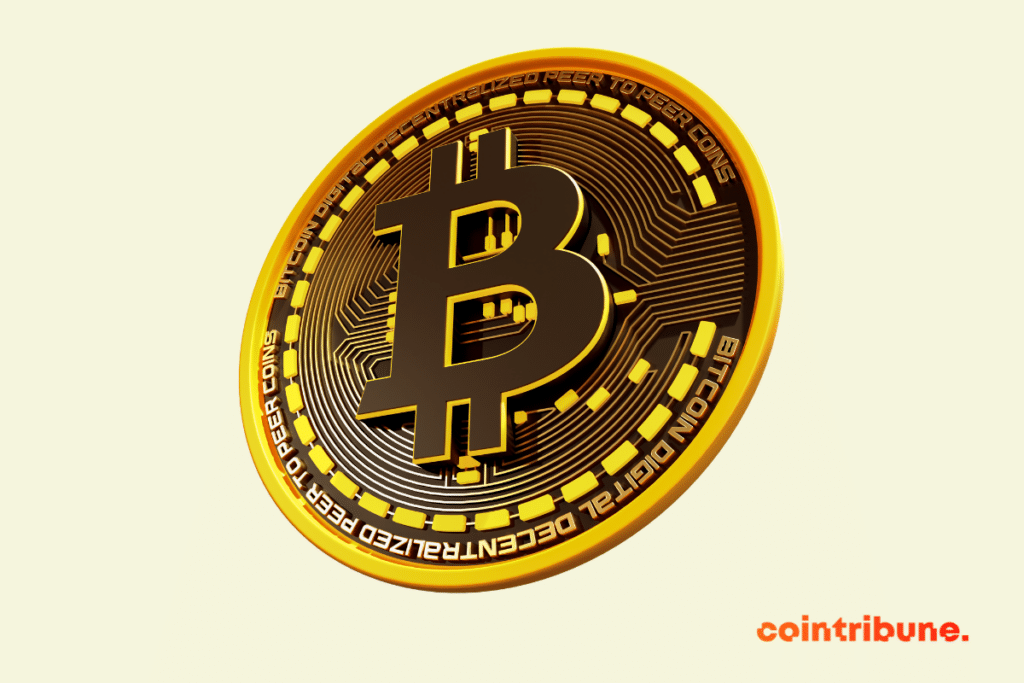Bitcoin Wallet: Everything You Need to Know
In a context where hacking and cryptocurrency theft unfortunately become common, Bitcoin security, which consists of protecting your digital assets against various online threats, is a more than major concern. Understanding how Bitcoin wallets work is therefore crucial. Indeed, these tools, designed to store, secure, and manage your cryptocurrencies, are at the heart of transactions in web3, and their judicious use is essential for anyone wishing to navigate smoothly in this exciting yet complex universe. Through our comprehensive guide dedicated to these essential instruments, we offer to demystify Bitcoin wallets, explain their subtleties, and accompany you step by step in their handling.

What is a Bitcoin wallet?
A wallet is a device, a medium, an online payment service. Its role: to store, manage, send, receive, control, and secure all your cryptos and bitcoins. Generally, the wallet comes in the form of an app on Android smartphones, software on computers, and even a physical wallet.
A Bitcoin wallet can be used to track ownership of cryptocurrencies and the available balance in real time. The more experienced users utilize this wallet to spend bitcoins and check their transaction history. Clever, isn’t it? Moreover, Bitcoin wallets are indispensable for interacting with the entire Bitcoin network.
Why use a Bitcoin wallet?
Using a Bitcoin wallet offers numerous advantages. First of all, the wallet provides enhanced security for all your crypto funds by allowing you to maintain control of your private keys. Given that wallets are all encrypted, your transactions and payments are secured. During your online activities or on a platform, your personal information never leaves your device. It is carefully stored by the protection mechanisms built into the phone or computer.
Secondly, the Bitcoin wallet allows you to manage your transactions independently and transparently, without going through a centralized financial intermediary or any platform. You can buy, trade, mine, or securely store your money. Nothing and no one can take it away from you! Finally, a Bitcoin wallet makes using cryptocurrencies easier by making transactions quick, low-cost, and accessible to all.
Types of Bitcoin wallets
There are several types of Bitcoin wallets, each with its own advantages, disadvantages, and specific security levels. They can be classified according to the following categories:
- Hardware wallets;
- Software wallets;
- Online wallets (web wallets);
- Paper wallets.
Each type of wallet has specific characteristics that allow for a distinction. So what are they?

Physical wallets or hard wallets
Hardware wallets, also known as hard wallets, are the best physical devices designed to store your private keys offline.
Hardware wallets indeed have a storage system that offers maximum protection against cyber attacks, ransomware, data theft, and any form of hacking.
Advantages
The physical or hardware wallet offers:
- Offline storage that guarantees the security of your data and cryptos;
- A unique solution against viruses and malware;
- An easy-to-use and backup interface;
- A physical connection system to use on any device.
Disadvantages
The physical wallet has several disadvantages:
- Very high cost or purchase price;
- Risk of loss or damage to the device;
- Less practical for frequent transactions.
Popular examples
Among the most well-known physical or hardware wallets, we can distinguish:
- Ledger Nano S and X: A pocket-sized hardware wallet easily connected to an Android smartphone;
- Trezor One and Model T: The new generation of hardware wallets that have received thousands of positive reviews; a wallet designed to offer various experiences;
- KeepKey: A 100% secure wallet to protect and store your bitcoins.
Software wallets or soft wallets
Software wallets, or soft wallets, are applications or programs directly installed on your computer, Android smartphone, or tablet. Their main mission is to ensure access to all your digital assets in record time. To do this, they store your private keys on your device to maintain the security of your transactions. Thus, you can easily check your funds.
Mobile applications
Mobile applications are the most advantageous wallets for users on the go. They can be installed on Android smartphones or tablets. You can download and use a mobile app to make online purchases or transactions with people who accept and exchange cryptocurrencies. Once installed, each wallet offers incredible accessibility and convenience. Mobile applications are actually soft wallets.
Advantages
The mobile wallet is recommended for several reasons:
- Better accessibility and excellent convenience in daily transactions;
- Easy and fast support for many cryptocurrencies;
- Additional features such as QR code scanning and push notifications;
- The ability to scan multiple wallet addresses via a QR code.
Disadvantages
The mobile wallet is exposed to many risks:
- A less robust security than hardware wallets;
- Theft or loss of the device;
- Vulnerability to cyber attacks and malware.
Popular examples
Here are some mobile wallets:
- Trust Wallet: an app that allows sending, receiving, and storing BTC (Bitcoin) and other cryptocurrencies;
- BRD Wallet: a user-friendly mobile app that helps protect your data and BTC;
Desktop applications
Desktop wallets are software installed on a computer. They offer more control and security compared to mobile wallets. They are immune to malware, viruses, and all types of hacking. Just like mobile applications, they can be classified in the family of soft wallets.
Advantages
Desktop applications:
- Provide an unparalleled experience;
- Ensure total control of private keys and backups;
- Support many cryptocurrencies;
- Feature an advanced user interface and extended functionalities.
Disadvantages
Desktop wallets are exposed to:
- Hacking or malware;
- Theft or loss of user devices;
- Risks of cyber attacks on Android or desktop.
Popular examples
Among the most popular desktop wallets, we can mention:
- Electrum: having received numerous reviews, this wallet is trustworthy and adapts to all possible uses;
- Exodus: here is a desktop wallet you need to exchange, store, or integrate multiple cryptocurrencies.
Online wallets (Web)
Online wallets, also known as “Web wallet”, are Web-based services. They store your private keys on their servers, allowing you to access your funds via a web browser. This browser is secure and is not subject to hacking. Online wallets are often used for the speed of transactions and the ease of access they provide. Unfortunately, they present less robust security than other types of wallets. Online wallets, as you might guess, are actually soft wallets.
Advantages
The advantages of online wallets are:
- Ease of use, especially for beginners;
- Accessibility via any device connected to the Internet (computer or smartphone);
- A practical interface accessible from an account created in the browser;
- Support for many cryptocurrencies.
Disadvantages
Web wallets have disadvantages:
- Less robust security due to online storage of private keys;
- Regular outages and cyber attacks;
- The risk of hacking and data theft via a browser;
- Dependence on a third party for managing private keys.
Popular examples
Here are some examples of web wallets:
- Blockchain.com wallet : An ideal solution for exchanging and ensuring quick transactions;
- MyEtherWallet: An original platform for making online payments;
- Metamask: A versatile electronic wallet that facilitates interactions with the Ethereum blockchain and smart contracts.

Paper wallets
Can be considered as hard wallets, paper wallets are printed documents containing your private and public keys in the form of QR codes or other formats. Very secure, they offer users a simple and inexpensive way to store cryptocurrencies offline. However, their use may be less convenient than other types of wallets.
Advantages
The advantages of paper wallets are:
- Secure offline storage that is resistant to cyber attacks;
- Low cost;
- A wallet suitable for long-term storage.
Disadvantages
The paper wallet is a type of wallet that has several disadvantages:
- Less practical for frequent transactions;
- Risk of loss, theft, or damage to the document;
- More complex process of creation and import.
How to create a paper wallet?
To hold your cryptocurrencies for the long term, the paper wallet is the best solution. If you want to create one, here are some tips.
- Use an online or offline paper wallet generator, such as BitAddress or WalletGenerator;
- Print the document containing your private and public keys. Make sure the information is accurate;
- Store the document in a safe place, protected from physical damage (water, fire).
Bitcoin Wallet Security
Security is a crucial aspect of managing your bitcoins. Securing your Bitcoin wallet helps protect against hacking, theft, or loss of funds. There are numerous measures that allow a user to safeguard their crypto assets. These measures vary depending on the type of wallet used. Some practices, however, apply to all types of wallets.
Essential Security Measures
To keep your data secure on a platform and protect your cryptocurrency funds, follow these principles:
Backup of the Private Key
Your private key must never be subjected to hacking. To avoid hacking, choose to create a backup. You can also write the key down in a safe and secure place, preferably offline.
Use of Strong Passwords
Just like firewalls and security devices on computers, using strong passwords is the best alternative for securing your Bitcoin wallets. Most importantly, use unique and complex passwords that only you can decipher. Write them down in a notebook that only you can access. This allows you to protect access to your wallet and your backups.
Software Updates
Take the necessary time to carry out regular updates of your software wallets and other hardware. Updates are essential if you want to benefit from the latest security enhancements and features.
Physical Security
Theft, loss, and physical damage are inconveniences that can affect your hardware wallet or a paper wallet. Hence, keep your wallets in a safe and secure place!
Advanced Practices
For those seeking enhanced and ultra-modern security, there are several advanced practices to strengthen the protection of your crypto funds.
Multisig Wallets
Multisig wallets require the approval of multiple private keys to execute a transaction. Choosing this solution provides an additional layer of security against attacks, ransomware, and human errors.
Use of Cold Wallets
Also known as “cold wallets,” cold wallets are designed to store your private keys offline. They also protect against hacking, automated bot attacks, and malware. They are well-suited for long-term storage of your cryptos.
SegWit Addresses
SegWit addresses (or “Segregated Witness”) offer advantages in terms of security and transaction fees. The aim of this practice is to assist users in managing their wallets. Using a SegWit-compatible wallet can reduce risks and costs associated with Bitcoin transactions.
How to Choose the Right Bitcoin Wallet for Your Needs?
The choice of the most suitable BTC wallet for your needs depends on several factors. Among these factors, we can identify the level of security, accessibility, transaction fees, and support for other cryptocurrencies.
Factors to Consider
Take the following elements into account when selecting your Bitcoin wallet:
The Level of Security
An unsecured wallet offers only inconveniences. Therefore, assess your security needs and filter. Then, choose a wallet that offers protections appropriate to your needs. Consider offline storage capacity, encryption, and two-factor authentication.
Accessibility
The Bitcoin wallet is primarily an easy-to-use and accessible tool, even for beginners. To make the right choice, consider how often you plan to conduct your transactions. Assess the various tools offered by the wallet to access your funds.
Transaction Fees
Transaction fees are one of the primary characteristics of a Bitcoin wallet. Compare them with other wallets, considering potential costs related to the speed of transactions, support for SegWit addresses, and any other constraints.
Support for Other Cryptocurrencies
If you own or plan to acquire other cryptocurrencies in addition to Bitcoin, look for a wallet that supports multiple currencies. This practice helps avoid the need to use multiple different wallets.
Comparison of Popular Wallets
Examine all the features, benefits, and drawbacks of popular wallets, such as Ledger, Trezor, Trust Wallet, and many more. Doing this comparison is a effective tip to determine which one best meets your needs.

How to Create and Use a Bitcoin Wallet?
Creating and using a Bitcoin wallet is one of the essential steps for managing and securing your crypto funds. Here is an overview of the process:
Creating a Wallet
To create a practical and easily accessible wallet, follow these tips:
- Choose the type of wallet that best suits your needs (Choose from those available: hardware, software, online, hot, paper);
- Follow the specific instructions for the wallet you have chosen to configure and secure it. You will be prompted to create a strong password and back up your private key;
- Write down or save your public Bitcoin address. You will use it to receive or send funds.
Receiving and Sending Bitcoins
To receive or send bitcoins, follow these instructions:
- To receive funds, share your public address with the person or service sending you funds;
You can use QR code scanning. Generally, transactions are processed within minutes, or in some cases, hours. This depends on transaction fees and network congestion.
- To send bitcoins, use the recipient’s Bitcoin address;
To do this, open your wallet, select the send option, and enter the recipient’s address along with the amount to send. Confirm the transaction and wait a few minutes for it to be processed.
Transaction Verification
Regularly checking the status of your Bitcoin transactions prevents illegal use or hacking of your wallet. To verify your transactions, use a blockchain explorer, such as Blockchain.com or Blockchair. Then, enter the Bitcoin address or transaction number (also known as “hash”) on the platform. The transaction details, such as amount, fees, and number of confirmations, will be displayed immediately.
Conclusion
In summary, a Bitcoin wallet is an essential tool for managing and securing your cryptocurrency funds. The different types of wallets offer various levels of security and accessibility. However, choosing the right wallet for your needs depends on several factors. By keeping in mind the various Bitcoin security tips and considering transaction fees and compatibility with other cryptos, you can select and use a Bitcoin wallet that meets your specific needs. Thus, you will manage your funds safely and efficiently. Remember that the world of crypto, while exciting, is also a fertile ground for Bitcoin scams. It is therefore essential to stay vigilant and informed to avoid falling into traps set by fraudsters.
Maximize your Cointribune experience with our "Read to Earn" program! For every article you read, earn points and access exclusive rewards. Sign up now and start earning benefits.
The Cointribune editorial team unites its voices to address topics related to cryptocurrencies, investment, the metaverse, and NFTs, while striving to answer your questions as best as possible.
The views, thoughts, and opinions expressed in this article belong solely to the author, and should not be taken as investment advice. Do your own research before taking any investment decisions.